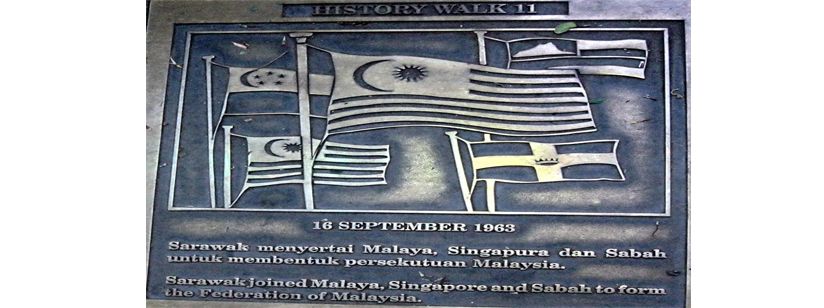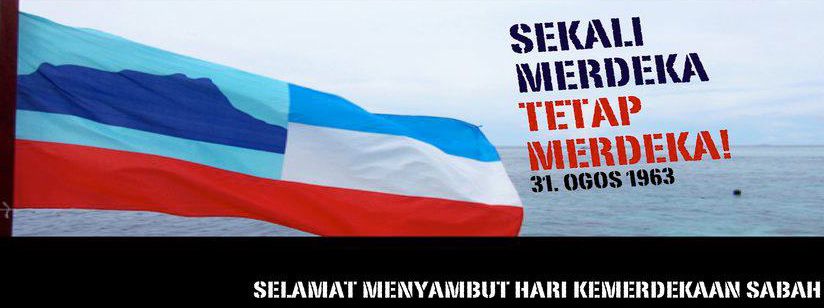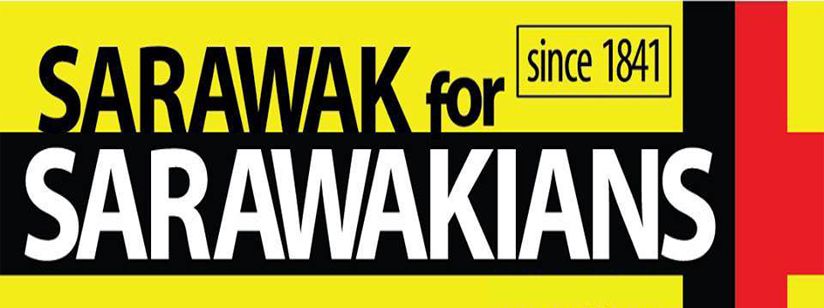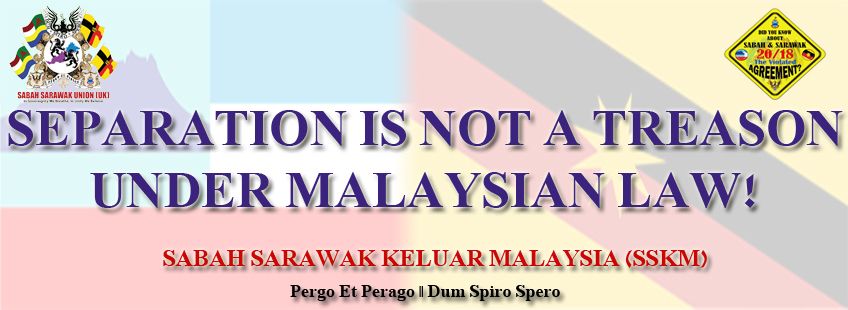- UMNO menjajah Sabah
- Sistem penggiliran Ketua Menteri, dengan mudah diguna sebagai pancing
- Kerusi DUN dan Parlimen Sabah dikuasai UMNO
- Perlantikan Ketua Menteri oleh Kuala Lumpur
- Kabinet pusat dimonopoli oleh Persekutuan Tanah Melayu
- Sabah dan Sarawak tidak penting lagi kerana Persekutuan Tanah Melayu (Malaya)menguasai lebih 2/3 kerusi parlimen (166 di Persekutuan Tanah Melayu, 25 kerusi di Sabah dan 30 kerusi Sarawak)
- Masalah PTI semakin bertambah
- Sabah menjadi negeri termiskin
- Sabah dan Sarawak menjadi negeri yang ke 12 dan ke 13.
- Rasuah, politik wang dan salah guna kuasa berleluasa
- Pemimpin Sabah kehilangan semangat untuk berjuang.
- Pemimpin Sabah tidak mampu membuat keputusan tanpa restu daripada Kuala Lumpur.
- Beratus ribu hektar keluasan tanah di Sabah diserahkan kepada pihak Semenanjung melalui FELDA. Tabung Haji, Yayasan Selangor, Yayasan Melaka dan Syarikat-Syarikat Gergasi Persekutuan Tanah Melayu.
Sunday, 21 June 2015
Sunday, June 21, 2015
Exposing the Truth
,
Fact
,
History
,
Sabah
,
Sarawak
,
Tragedy Double Six
4
comments
RAHSIA KEMATIAN TUN FUAD DALAM SATU NAHAS KAPAL TERBANG
Info ini adalah kebenaran yang cuba disembunyikan malah berusaha untuk dihapuskan namun sehingga kini usaha tersebut menemui jalan buntu. Ia seperti malam dan siang. Mampukah waktu malam bertahan selamanya? Begitu juga waktu siang...
Sila baca dan sebarkan...
Ketua menteri Sabah yang tidak akur kepada kehendak Kuala Lumpur digulingkan.
Sejak Sabah memperoleh kemerdekaan pada 31hb Ogos 1963, Kuala Lumpur telah memastikan supaya mana-mana Ketua Menteri Sabah tidak akan bertahan lama apabila mereka tidak akur kepada kehendak Kuala
#Donald Stephens (Tun Fuad) terpaksa meletakkan jawatan sebagai Ketua Menteri Sabah pertama kerana dihantar sebagai Pesuruhjaya Tinggi Malaysia di Australia, digantikan oleh Datuk Peter Lo dari SCA pada tahun 1965 dengan penglibatan pemimpin Kuala Lumpur (Syed Kechik sebagai penasihat kepada Tun Mustapha dikatakan telah memainkan peranan penting dalam hal ini). Ini kerana Donald Stephens sebagai Ketua Menteri Sabah pertama telah memperlihatkan kesungguhannya mempertahankan Konsep Asal Pembentukan Malaysia iaitu 'rakan sama rata'. Tun Fuad juga mahu merujuk semula kedudukan Sabah dalam Malaysia setelah Singapura disingkir dari Malaysia. Ini kerana, keputusan Sabah menyertai pembentukan Malaysia adalah disebabkan oleh Singapura dan baginya tidak ada sebab lagi bagi Sabah bersama dengan Malaysia tanpa kehadiran Singapura. Tindakan serupa juga dilakukan oleh Kuala Lumpur untuk menggulingkan Stephen Kalong Ningkan, Ketua Menteri Sarawak pertama.
#Apabila Kerajaan Berjaya ditumbangkan PBS dalam pilihanraya 1985, Datuk Joseph Pairin (Tan Sri) tidak mendapat sokongan sepenuhnya oleh Kuala Lumpur kerana perjuangan PBS pimpinan Datuk Joseph Pairin Kitingan (Tan Sri) pada ketika itu dilihat mencabar kepimpinan Persekutuan dengan mengungkit hal berkaitan dengan 20-PERKARA dan Perjanjian Malaysia yang di perkenalkan oleh Datuk Dr Jeffrey dalam perjuangan PBS. Malangnya PBS telah tidak mendalami hal-hal berkaitan dengan 20-Perkara, Suruhanjaya Cobbold, IGC dan Perjanjian Malaysia sebagai tonggak perjuangan, sehingga begitu mudah PBS kembali ke pangkuan Barisan Nasional.
#Agenda Petronas, tidak menyenangkan Kuala Lumpur. Difahamkan bahawa Tun Datu Mustapha menuntut supaya Sabah mendapat 35% daripada hasil minyak petroleum Sabah, sedangkan Kuala Lumpur hanya mahu memberi 5% kepada Sabah. Dengan fitnah bahawa kononnya Tun Datu Mustapha sedang merancang membawa keluar Sabah dari Malaysia, Kuala Lumpur menaja Parti BERJAYA untuk menumbangkan USNO dalam pilihanraya negeri pada tahun 1976. Dalam pilihanraya tersebut, USNO telah tumbang di tangan BERJAYA.
#Keengganan Tun Datu Mustapha, Ketua Menteri Sabah untuk tunduk kepada kehendak Kuala Lumpur pada tahun 1975, menyebabkan Kuala Lumpur tidak selesa dan melihat tindak-tanduk Tun Datu Mustapha sebagai menggagalkan usaha Kuala Lumpur untuk terus menguasai Sabah. Keengganan Tun Datu Mustapha untuk menyerahkan kekuasaan minyak petroleum Sabah kepada Kuala Lumpur melalui perjanjian Petronas
#Selain itu, peristiwa 'Double Six' juga banyak menimbulkan persoalan di kalangan rakyat Sabah. Dalam peristiwa ini, Tun Fuad Stephens, Ketua Menteri di bawah Kerajaan Berjaya yang baru memerintah selama 51 hari bersama 4 ahli kabinet menterinya telah ditimpa nahas kapal terbang dalam penerbangan balik ke Kota Kinabalu dari Labuan. Tun Fuad tidak menandatangani perjanjian penyerahan kuasa petroleum kepada Petronas dalam pertemuannya dengan rombongan Kuala Lumpur di Labuan kerana, baginya perkara itu harus dibawa dalam mesyuarat kabinet dahulu. Datuk Haris Salleh, Ketua Menteri Sabah yang telah menggantikan Tun Fuad Stephens telah mendapat sokongan sepenuhnya oleh Kuala Lumpur dengan kenyataan Mahathir, “berenang dan tenggelam bersama Berjaya”. Datuk Haris Salleh telah menandatangani penyerahan kekuasaan petroleum Sabah kepada Kuala Lumpur melalui Petronas, pada 14hb Jun 1976, iaitu 8 hari selepas nahas kapal terbang yang meragut nyawa Tun Fuad dan rakan- rakannya, tanpa dibawa dalam perbincangan kabinet menterinya.
#UMNO memasuki Sabah dan merampas kuasa.
UMNO memasuki Sabah selepas memperdayakan USNO untuk menerima UMNO masuk ke Sabah. UMNO memang sudah lama berhasrat memasuki Sabah namun tidak berjaya kerana tidak diberi restu oleh pemimpin- pemimpin USNO. Hanya dengan hasutan UMNO kepada USNO, UMNO telah berjaya memasuki Sabah. “UMNO pernah berhasrat melebarkan sayapnya ke Sabah dengan jemputan dan ditaja oleh Datuk Muhammad Dun Banir bersama rakan-rakannya pada tahun 1980an, namun impian parti itu tidak terlaksana kerana tidak mendapat sokongan dari USNO, akhirnya UMNO menangguhkan niatnya untuk sementara waktu. Perselisihan faham di antara USNO dan kerajaan PBS pada tahun 1985/1986 telah diintai oleh UMNO dan menghasut USNO supaya tidak mempercayai Kerajaan PBS, seterusnya mendesak pemimpin USNO untuk membenarkan mereka masuk ke Sabah dalam keadaan “menangguk air di air keruh (ambil kesempatan)”.- Datu Badarudin Tun Datu Mustapha sempena Deklarasi Semporna dalam Rapat Umum USNO 50 Tahun pada 29hb Januari 2012.
#Akibat hilang kuasa kemerdekaan:
Dengan kehadiran UMNO di Sabah, manipulasi mereka semakin rancak. Manipulasi yang hebat dilakukan UMNO di Sabah adalah dengan merampas kuasa pemerintahan daripada PBS. Walaupun dengan janji Anuar Ibrahim membangun Sabah menjadikan Sabah Baru dalam masa 100 hari, Barisan Nasivonal pimpinan UMNO di Sabah gagal memenangi pilihan raya umum pada tahun 1994.
Selepas keputusan pilihanraya pada tahun 1994 diumumkan dengan PBS (bersama USNO) memenangi majoriti kerusi DUN, YB Datuk Joseph Pairin Kitingan dan Tun Mustapha bersama wakil-wakil rakyat PBS (bersama USNO) telah pergi ke istana untuk mengangkat sumpah sebagai barisan menteri kabinet Sabah yang baru. Namun mereka tidak dapat memasuki istana kerana pintu masuk ditutup atas arahan Datuk Megat Junid, Timbalan Menteri Hal Ehwal Dalam Negeri, Malaysia ketika itu, menyebabkan semua wakil rakyat termasuk Datuk Joseph Pairin Kitingan dan Tun Mustapha terpaksa 'berkurung' di rumah kediaman rasmi Presiden PBS, YB Datuk Joseph
Mari sampaikan kebenaran ini kepada diri-sendiri dahulu, keluarga, sahabat handai dan rakan-rakan serta semua orang di kampung dan bandar...
Sunday, June 21, 2015
Agreement of Malaysia
,
Borneo
,
Earthquake
,
Exposing the Truth
,
Fact
,
North Borneo
,
Sabah
,
Sharing
1 comment
Ranau earthquake: If Najib truly loves Sabah...
OUTSPOKEN: It takes a natural disaster like the powerful earthquake that literally shook Mout Kinabalu on June 5, to give a real test on the leadership qualities of Malaysia's national and state leaders.
If Prime Minister Najib Razak truly believes in his own slogan of 1Malaysia and considers Sabah as a “fixed deposit” state, then he would have reacted very differently when the 5.9 magnitude earthquake occurred at 7.15am that day with its epicentre about 15km north of Ranau town.
As soon as he was told of the incident and briefed on the seriousness of the situation he, as head of the central government, should have dropped everything else immediately and paid full attention to the crisis and ensured that the government responded to the crisis promptly and appropriately.
In his capacity as chairman of the National Security Council, he should have realized the gravity and magnitude of the disaster by quickly declaring it as a national disaster zone, so that the full force of top level authority would come into play.
Once that was done, the state security committee headed by chief minister Musa Aman, who technically is responsible for the officials in charge at the crisis centre on the ground, would have the administrative power to execute all necessary search and rescue (SAR) operations without delay.
It was truly a case of grave crisis and emergency on a national scale, considering that lives of such a large number of Malaysian citizens as well as nationals from so many foreign countries were at risk that day.
It was a frightening thought; having 137 climbers, including young children, being stranded close to the top of the mountain that is cold and windy. They must also be in a state of shock and fear, having just experienced the powerful earthquake. There were also 30 or more Malaysian mountain guides with the climbers.
At times of emergency such as this, top concern must surely be to save lives.
If given the power from the top national leaders, officials at the crisis centre could have the ability to mobilise helicopters and other support services from the armed forces, police, private aviation companies and other organisations without question and within the first couple of hours.
A distinct advantage was that it occurred early in the morning, leaving the emergency units about 11 daylight hours to plan and execute their SAR operations. For, in the far east state of Sabah, it gets dark as early as 6.30pm.
From the national point of view, Mt Kinabalu, the centre of all attention that day, is the nation's icon tourism spot. Many promotional materials of Tourism Malaysia, including its TV commercials prominently feature the mountain.
This icon, reputed for having the tallest peak (at 4,095m above sea level) in Southeast Asia, is also a Unesco World Heritage Site and the 20th most prominent mountain in the world.
The disaster could not have struck at a worst time. It was during school holidays, one of the peak seasons for local and foreign climbers, including young pupils in their early teens, mostly having their first experience in mountain climbing.
Did Najib see the situation in these lights and act accordingly? Obviously not, for he went ahead with his travel plans for Saudi Arabia, which according to him, “involving meetings with members the Saudi royal family”.
Surely the Saudi royal family would be gracious enough to accept and excuse him for having to change travel plans due a state of emergency at home.
Another error in judgement was when Musa declared June 8 as “a day of mourning” for Sabah calling on the people to fly flags at half-mast in the state. The appropriate mark of remembrance for the four mountain guides and other Malaysians who died as a result of the quake is a national day of mourning.
It was a national affair, not state. Has Najib forgotten that citizens in Sabah are Malaysians, equal to those anywhere in the country? Whither the 1Malaysia concept?
By contrast, the Singapore government saw it fit to declare a national day of mourning for the two teachers and eight pupils from Tanjong Katong Primary School who died as a result of the earthquake. They did not say that the mourning was for that school alone, but for the whole nation.
Reflecting further on the dire consequences of disasters that Malaysians in Sabah have to bear resulting from the earthquake, somehow the words of a Czech television host on such disasters spring to mind.
“We cannot stop natural disasters but we can arm ourselves with knowledge: so many lives wouldn't have to be lost if there was enough disaster preparedness,” said Petra Nemcova, a victim of the Indian Ocean earthquake and subsequent tsunami in 2004.
In many ways, the Malaysian Government was ill prepared for the Ranau earthquake; not having sufficient knowledge nor enough disaster preparedness to deal promptly and efficiently with the catastrophic situation.
It is often said that prevention is better than cure. True, but good advice such as this is not always followed. Regrets usually come after the fact.
A few days after the earthquake came the disclosure that the Minerals and Geoscience Department in Sabah had proposed to the federal government in 2013 to install an earthquake monitoring system that includes the installation of GPS monuments along fault lines in the vicinity of Mt Kinabalu.
The request for an allocation of RM7 million for implementation of the project was turned down.
Alexander Yan, former director of the department, told The Borneo Post on June 8 that had the proposal been given the nod, lives could have been saved from the earthquake that claimed 18 lives and caused injury to many climbers and guides.
Now the Malaysian Government has announced an allocation of RM10 million just for rehabilitation works on the mountain.
Other costs such as relief measures and the rebuilding of public and private infrastructures in and around Kudasang and Ranau that are damaged by the quake and the subsequent mudslides in the past week that caused further havoc would go way beyond that figure.
As seen in other cases of natural disasters elsewhere in the country, a happy and positive sign that emerged from the Ranau earthquake was the spontaneous response of many individuals, community groups, NGOs and service organisations, in showing unity, love and care through their various acts of charity.
This Malaysian bond shown in the last two weeks by the ordinary folks in time of need, pain, sorrow and suffering is most admirable.
Sarawakian Datuk Joseph Leong Sai Ho, who has been living in Sabah since 1966, has his eye on all things Borneo.
Sunday, June 21, 2015
Borneo
,
British
,
England
,
Exposing the Truth
,
Fact
,
History
,
North Borneo
No comments
BRITISH NORTH BORNEO TREATIES: MADRID PROTOCOL 1885
Towards the close of 1763, the Sultan of Sulu added to his cession the northern portion of Borneo and the Southern half of Palawan, together with all the intermediate islands.
Against all these cession, the Spanish entered their protest. Spanish claimed the suzerainty over the Sulu Archipelago and the Sulu Dependencies in Borneo and the islands. This claim the Spaniards always persisted in, until on the 7th March 1885, a Protocol was entered into by England, Germany and Spain whereby Spanish supremacy over the Sulu Archipelago was recognised on condition of their abandoning all claims to the portions of the Northern Borneo which are now included in the British North Borneo Company's Concessions.




























































